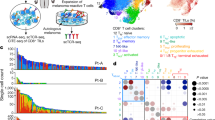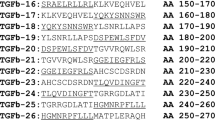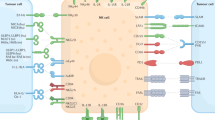Abstract
The recognition by T cells of antigens displayed or presented on the cell surface is generally restricted by the products of genes in the major histocompatibility complex (MHC)1. Thus, most cytotoxic T cells recognize antigens in conjunction with self MHC determinants, especially in the response against virus-infected lymphocytes2, chemically modified self antigens3 and tumour cells4. In these situations, the majority of cytotoxic T-cell clones seems to recognize MHC determinants unique to the individual alleles (‘private’-type determinants). However, certain cell surface antigens seem not to be subject to such rigid MHC restriction5–7. These apparent exceptions could be incorporated into the MHC-restriction model by postulating the involvement of public-type determinants of MHC as restriction site, but until now no cross-killing across species barrier has been reported in these instances. We now report that mouse cytotoxic T cells induced in primary culture by syngeneic melanoma cells killed various human melanoma cell lines in an antigen-specific fashion.
This is a preview of subscription content, access via your institution
Access options
Subscribe to this journal
Receive 51 print issues and online access
$199.00 per year
only $3.90 per issue
Buy this article
- Purchase on Springer Link
- Instant access to full article PDF
Prices may be subject to local taxes which are calculated during checkout
Similar content being viewed by others
References
Zinkernagel, R. M. & Doherty, P. C. Adv. Immun. 27, 52–177 (1979).
Zinkernagel, R. M. & Doherty, P. C. J. exp. Med. 141, 1427–1436 (1975).
Shearer, G. M. Eur. J. Immun. 4, 527–533 (1974).
Shader, J. W. & Edelman, G. M. J. exp. Med. 143, 601–614 (1976).
Lindahl, K. F. Immunogenetics 8, 71–76 (1979).
Molnar-Kimber, K. & Sprent, J. J. exp. Med. 151, 407–417 (1980).
Forma, J. & Flaherty, L. Immunogenetics 6, 227–233.
Burton, R. C., Chism, S. E. & Warner, N. L. J. Immun. 118, 971–980 (1977).
Shaw, S., Nelson, D. L. & Shearer, G. M. J. Immun. 121, 281–289 (1978).
Holden, H. T. & Herberman, R. B. Nature 286, 250–252 (1977).
Shinohara, N., Sachs, D. H., Nonaka, N. & Yzmamoto, H. Nature 292, 362–363 (1981).
Shinohara, N. & Sachs, D. H. J. Immun. 126, 934–937 (1981).
Herlyn, M. et al. Cancer Res. 40, 3602–3609 (1980).
Wilson, B. S., Indiceri, F., Pellegrino, M. A. & Ferrone, S. J. exp. Med. 149, 658–668 (1979).
Author information
Authors and Affiliations
Rights and permissions
About this article
Cite this article
Wakabayashi, S., Taniguchi, M., Tokuhisa, T. et al. Cytotoxic T lymphocytes induced by syngeneic mouse melanoma cells recognize human melanomas. Nature 294, 748–750 (1981). https://doi.org/10.1038/294748a0
Received:
Accepted:
Issue Date:
DOI: https://doi.org/10.1038/294748a0
This article is cited by
Comments
By submitting a comment you agree to abide by our Terms and Community Guidelines. If you find something abusive or that does not comply with our terms or guidelines please flag it as inappropriate.



